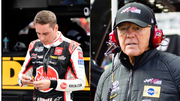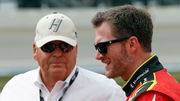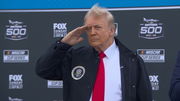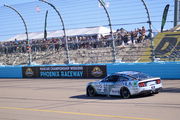
via Imago
TALLADEGA, AL – APRIL 23: Jeff Gordon looks on before the running of the NASCAR, Motorsport, USA Cup Series Geico 500 on April 23, 2023, at Talladega Superspeedway in Talladega, AL. Photo by Jeffrey Vest/Icon Sportswire AUTO: APR 23 NASCAR Cup Series GEICO 500 EDITORIAL USE ONLY Icon230423473500

via Imago
TALLADEGA, AL – APRIL 23: Jeff Gordon looks on before the running of the NASCAR, Motorsport, USA Cup Series Geico 500 on April 23, 2023, at Talladega Superspeedway in Talladega, AL. Photo by Jeffrey Vest/Icon Sportswire AUTO: APR 23 NASCAR Cup Series GEICO 500 EDITORIAL USE ONLY Icon230423473500
In NASCAR, sponsorship is pretty much everything for drivers, teams, and even the race tracks. Without sponsors, many drivers have a hard time racing, something that Kyle Busch can attest to. The United States is a country that is chock-full of some of the biggest brands in the world. Different sports are platforms for these brands to get some good advertising, and NASCAR is no different.
Talking of sponsors, two hugely popular brands in NASCAR have been Pepsi and Coca-Cola, who also happen to be massive beverage rivals.
The two brands are so big that they even became title sponsors for some NASCAR races. To be precise, we had the Pepsi Max 400 at the Auto Club Speedway and the Coca-Cola 600 at the Charlotte Motor Speedway. It is also worth noting that both brands have sponsored the same race at different periods of time. From 1985 to 2007, the Pepsi 400 was held at the Charlotte Motor Speedway, but it has since been known as the Coca-Cola 600. Meanwhile, there is also the Coke Zero Sugar 400 at the Daytona International Speedway.
ADVERTISEMENT
Article continues below this ad
Pepsi even enjoyed an iconic NASCAR partnership for sometime
Another thing worth mentioning is that Pepsi is also best known for being a primary sponsor for none other than Jeff Gordon. The two even shot a couple of short films together, which have been fairly iconic. In short, Pepsi was a massive presence in the NASCAR scene for a very long time. It would be years later when the Pepsi brand rose to prominence once again, thanks to a certain Jeff Gordon. As per IndyStar, he once said, “They believed in NASCAR and its fanbase and they were excited about it. They really wanted to get behind it and support it from a marketing standpoint. That was something that we were lacking. They said, ‘Hey! Let’s do some big things here’.”

via Getty
KANSAS CITY, KS – SEPTEMBER 30: Jeff Gordon, driver of the #24 DuPont Chevrolet, looks on in the garag, during practice for the NASCAR Nextel Cup Series Banquet 400 on September 30 at Kansas Speedway in Kansas City, Kansas (Photo by Brian Bahr/Getty Images)
Sadly, all good things must come to an end, and it did for Pepsi. The soft drinks brand has a history that dates all the way back to 1949. Pepsi has its roots in the South, been founded in North Carolina. Since NASCAR’s birthplace was also the south, a marriage between the two, made sense. In 1969, the brand sponsored its first-ever NASCAR race at the Darlington Raceway.
Two years later, it tasted victory as a sponsor of the legendary Richard Petty. The 7-time NASCAR Cup Series champion triumphed at the Atlanta Motor Speedway in the Dixie 500. Later that same year, the next victor was Tiny Lund at North Wilkesboro. Finally, Lennie Pond competed in the 1976 season with full-time Pepsi sponsorship and finished 5th.
Trending
When did Coca-Cola join the party and initiate the soda war?
During the early 1990s, Coca-Cola began to rise in prominence, thanks to Kyle Petty. Since then, it slowly gained popularity and the war truly began. Back in 1997, Coca-Cola replaced Pepsi as NASCAR’s official soft drink, which was part of a 5-year deal. To make matters worse for Pepsi, for the 1998 season, Coca-Cola inked a deal with the biggest NASCAR driver at the time, Dale Earnhardt.
What worked in Coca-Cola’s favor was the fact that Dale Earnhardt was hugely successful. In addition to that, he was one of Gordon’s biggest rivals and Earnhardt boasted of one of the biggest fanbases. On the other end of the scale, Pepsi was not completely down and out because they still had Gordon who was a rising star. The best part was that they owned the vendor rights to majority of the NASCAR tracks and two sponsored race events.
In 2007, Coca-Cola struck a deal with the International Speedway Corporation. This multi-million dollar deal was about taking over the vending rights for 10 of the ISC’s 13 owned tracks over the next few years. One track that fell under this umbrella was none other than the Daytona International Speedway. Thus ended a 50-year partnership between Pepsi and Daytona, and the Coke Zero Sugar 400 was born.
ADVERTISEMENT
Article continues below this ad
When did things start to go wrong for Pepsi in NASCAR?
As Coca-Cola practically declared war on the multi-million dollar deal, Pepsi had to respond. They responded by signing a contract with none other than Dale Earnhardt Jr. Of course, PepsiCo was not promoting the Pepsi brand, but its Amp Energy brand on the #88 Hendrick Motorsports car. This was a brilliant tactic because Dale Jr was the sport’s most popular driver at the time, and held that title for several years.
In short, PepsiCo had two of the most marketable drivers under their umbrella, so where did it all go wrong? From 2009, the Darlington Raceway began selling Coca-Cola beverages during the Southern 500. In 2011, it was Watkins Glen’s turn to follow suit, and soon more and more race tracks switched to Coca-Cola. To make matters worse, the gamble on Dale Jr backfired as he didn’t really perform up to expectations. Then it wasn’t long before Dale Jr also decided to hang up his own racing boots. Of course, PepsiCo tried to continue on with Chase Elliott and Kasey Kahne, with Mountain Dew. Sadly, that has not lasted very long, and it appears that Coca-Cola is winning the war.
ADVERTISEMENT
Article continues below this ad
WATCH THIS STORY: Jeff Gordon’s Take on Denny Hamlin’s “Villain” Persona
On the other end of the scale, the marketing teams were still working their magic. However, it was not enough as more and more speedways were switching to Coke. In 2015, Jeff Gordon was competing in his final season before retiring, and this was also the end of an era for Pepsi as well. Since Gordon’s departure, the Pepsi colors have been largely absent from the NASCAR Cup Series. The good news was that there was still some PepsiCo representation, thanks to Mountain Dew. The final death knell was when Monster Energy, owned by Coca-Cola, took over as the Cup Series title sponsor (2017–19).
ADVERTISEMENT
ADVERTISEMENT
ADVERTISEMENT
ADVERTISEMENT






